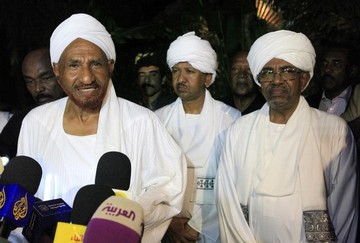Sudan’s NUP rejects constitutional amendments
January 7, 2015 (KHARTOUM) – The opposition National Umma Party (NUP) rejected the amendments approved by the Sudanese parliament last week calling it mere “distortions” that harmonized the interim Constitution of 2005 with the actions of the government which consistently breached its articles.

The NUP said it has formed a committee that is working on a detailed study of the amendments and their impact on the political, legal and international situation of the government.
The statement mentioned that the transitional constitution expired since July 9, 2011 which necessitated the creation of a new constitution, adding that all Sudanese forces agreed on the drafting of a constitution in an inclusive process.
“Therefore the rush of the parliament to quickly make these distortions as an attempt to impose more control over the outcome of their planned elections that are useless and futile, in a desperate attempt to secure the election of the one ruler, out of hope of finding protection for him from the reach of the International Criminal Court”.
“We reject these distortions in form, content and timing, and we see them as a loss for the dignity of the Sudanese people, and a waste of the sovereignty of the state of Sudan”. “If they used any of the Sudanese legal minds the Sudanese parliament would not have indulged in these erroneous, obvious and flagrant constitutional distortions”.
Sudanese lawmakers on Sunday approved three controversial constitutional amendments introduced by the ruling National Congress Party (NCP).
The first bill allows the president to appoint governors who will no longer be elected through universal suffrage. The second transforms the National Intelligence and Security Services (NISS) into regular force to legitimize the creation of its militia the Rapid Support Forces (RSF). Finally the third reform is the inclusion of Doha Document for Peace in Darfur (DDPD) in the constitution.
The party accused president Omer Hassan al-Bashir of continuing to violate the 2005 interim constitution by removing elected governors and encroaching on their powers as well as creating new states and integrating others.
It also mentioned the passing of the National Security Act contrary to the text of Article 151 of the constitution which defined the functions of the security appratus.
“The regime protected the Rapid Support Forces (RSF) that was established by the security apparatus and bestowed immunity on their actions that wracked panic among citizens…therefore, the amendment to Article (151) of the functions of the national security service matched its duties with those of the armed forces and turned into to regular troops belonging to the Head the Republic”.
The NUP said that amendments article (151) proved the credibility of the view of the party leader al-Sadiq al-Mahdi in May 2014 when he argued that the RSF is unconstitutional in its composition, and therefore charges brought against him were malicious.
The party felt that the amendments defeat the purpose of the constitution contained in its preamble on democracy and decentralization that have been desired by Sudanese since independence to allow them to rule for themselves.
It said that the amendments asserted the one-party rule and ended the principle of separation of powers as the judicial branch is now under unprecedented presidential control on top of his direct leadership of the security apparatus.
The NUP warned that the amendments will lead to resentments by different regions and further aggravate further violence in further of a feeling of marginalization by ethnic groups.
(ST)
